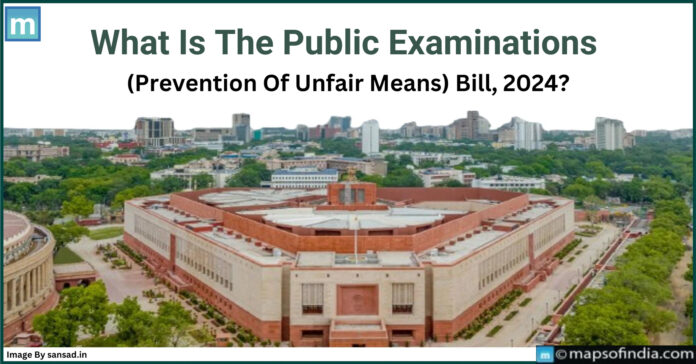The Public Examinations (Prevention of Unfair Means) Bill, 2024 is a landmark legislation to curb the menace of cheating and malpractices in public examinations. The bill proposes stringent measures to prevent and penalise unfair means in tests conducted by various public examination authorities.
The bill’s introduction comes in response to the growing concern of question paper leaks and organised cheating in recruitment exams nationwide. This legislation is a significant step towards protecting the future of millions of students by ensuring transparency, fairness, and credibility in public examinations.
What Is The 2024 Public Examinations (Prevention Of Unfair Means) Bill?
The Public Examinations (Prevention of Unfair Means) Bill, 2024 is comprehensive legislation designed to prevent and penalise unfair means in public examinations. The bill defines public examinations as those conducted by public examination authorities listed in the schedule, including the Union Public Service Commission, Staff Selection Commission, and Railway Recruitment Boards.
Need For The Bill
This legislation is needed due to the large number of instances of question paper leaks and malpractices in recruitment exams, which have resulted in examination cancellations and lost opportunities for millions of students. The lack of a specific substantive law to deal with unfair means in public examinations necessitates comprehensive central legislation to address this issue.
Key Provisions Of The Bill
The bill proposes several key provisions, including the definition of public examinations, punishments for offences, and the formation of a High-Level National Technical Committee on Public Examinations. It also mandates that offences under the proposed law be investigated by officers who are not below the rank of Deputy Superintendent of Police or Assistant Commissioner of Police.
Punishments And Offences
The bill says that all crimes under it will be severe, you can’t get bail for them, and they can’t be settled outside of court. Anyone who cheats or commits these crimes can go to jail for three to five years and may have to pay a fine of up to Rs 10 lakh. Additionally, companies or people hired by the public examination authority who break the rules can be fined up to Rs 1 crore. This means that individuals and service providers face strict penalties if involved in unfair practices.
Investigation And Enforcement
The bill mandates that offences under the proposed law will be investigated by officers at the rank of Deputy Superintendent of Police or Assistant Commissioner of Police. Additionally, the bill proposes the formation of a High-Level National Technical Committee on Public Examinations to develop protocols to secure digital platforms and devise strategies for implementing foolproof IT security systems.
Concerns Related To The Bill
While the bill aims to serve as a model for states to adopt, concerns arise regarding the discretion given to state governments, which may lead to variations in implementation across different states. Moreover, the bill’s provisions may contain loopholes that can be exploited to evade criminal sanctions.




